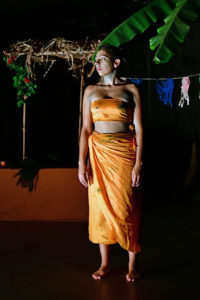Perfect Shade – Basement Theatre – 11 February 2020: Theatre Review
Does colourism exist? Yes, yes it does. But ask someone if they have ever been guilty of it and the answer may not be so clear cut. Perfect Shade is a provocative one-person show exploring our conflicted obsession with the colour of our skin.
Perfect Shade (developed through Basement’s Ideas in Residence development initiative) is a solo performance work created by none other than Sarita Das, a non-binary, multidisciplinary artist who earlier this month had audiences enraptured during Our Gala when they debuted their live music under the moniker Rotigurl, the new genre of Queer Bengali Dance-Rap birthed before all that night absolutely exhilarating.
 Both co-founder of Bodyhaus and a Somatic Sex Educator, Perfect Shade sees Das incorporate elements of drag, live music and performance art in a production that is autobiographical in nature, their heritage as Bengali-Pakeha allowing them to unpack before the audience the ‘politics around colourism and bi-racial identities’ as well as their own ties to both the traditional past as well as their desires to express themselves freely in the present and future; the opening scene which shifts from the traditional Bengali song Krishnakoli Aami Tarei Boli into Betty an original Rotigurl piece both composed and performed live by Das, illustrating this.
Both co-founder of Bodyhaus and a Somatic Sex Educator, Perfect Shade sees Das incorporate elements of drag, live music and performance art in a production that is autobiographical in nature, their heritage as Bengali-Pakeha allowing them to unpack before the audience the ‘politics around colourism and bi-racial identities’ as well as their own ties to both the traditional past as well as their desires to express themselves freely in the present and future; the opening scene which shifts from the traditional Bengali song Krishnakoli Aami Tarei Boli into Betty an original Rotigurl piece both composed and performed live by Das, illustrating this.
It is directed by Sananda Chaterjee. While the production is non-linear, there is indeed a baseline upon from which Perfect Shade grows, Das beginning by divulging many of the conflicting ideals they experienced with their own body in earlier years and how they believed at the time it should be presented to the world (smoother, lighter, less brown) while jogging on the spot; their request for the audience to enthusiastically clap every time they slowed down, thus forcing them to continue, a statement in itself on how society often imposes its ideals of acceptable standards of beauty and what it means to be desirable.
Why is it that we desire for ourselves the skin colour that we do? And how do we perceive it? How can society hold up those who are blue-eyed, blonde and tanned as symbols of achievement while simultaneously marginalising minority races? While Das challenges their audience to explore these questions honestly within themselves, they also remind those – with great love – that are not a person of colour that they are indeed privileged to have access to the conversation currently being presented before them. For they are correct in their statement, the conversation is one that should be held ‘within and between communities of colour’. It is not an opportunity to participate, pushing forth opinions that only serve to marginalise and minimise further, but an opportunity to observe, to listen and to learn; further discussions on the topic at hand – if so desired – to be held within one’s own community.
Masterfully exploring words and the connotations that they hold, the repetition of them spoken in a different tone, once again illustrated how language can be damaging when spoken without care or knowledge; Das’s monologue of being inadvertently labelled as a child, a plea to consider our words before painting the person standing before us with them, all providing further food for thought.
Perfect Shade is theatre with realness, Sarita Das utilising her skills as a multidisciplinary artist to present a performance piece that should be compulsory viewing for all.
~Sarah Kidd
Perfect Shade runs through 15 February at Basement Theatre. Tickets available HERE.
- Theatre Review: Meremere – Q Theatre – 10th April 2021 - 14/04/2021
- Deep, Q Theatre, 25 February 2020: Theatre Review - 29/02/2020
- No Holds Bard, Q Theatre, 25 February: Theatre Review - 28/02/2020
